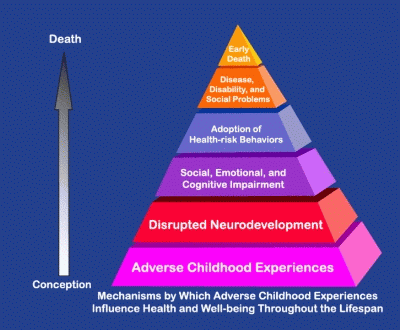March, 2015
Intro to the ACE Study
by Larry
In life, we need to play the hands we're dealt. Unlike in card games, though, if in our childhoods we had ACEs high, things are apt to be more challenging. The acronym "ACE" in this instance stands for Adverse Childhood Experiences, and if, as in "Prairie Home Companion," our children are all above average on the ACE Study, it likely means more trauma as they were growing up. The ACE Study involves a series of questions about one's life prior to the 18th birthday. To quickly take and score the questionnaire yourself, just go to their website. Meanwhile, I shall get my score too. As of this writing, I am new to this myself. Be right back.
OK. How did you come out? Did you "ace the test?" It is not necessarily a good thing to have a higher ACE score. However, this exercise seems more about coping with things, for which greater knowledge is constructive.
Chances are you, like me, had neither a perfect childhood nor the worst possible one. Still, what are we to make of the questionnaire results? There are no absolutes here. Some folks with very high ACE Study scores, meaning lots of childhood trauma or adversity, go on to lead highly successful, good quality, and long lives. And some with better than average scores wind up having difficulty, taking on unhealthy practices, missing out on some of life's potential, and even dying early.

The ACE Pyramid (Wikipedia) |
Still, as guidelines, The Centers for Disease Control and Prevention and Kaiser Permanente suggest that the higher one's ACE Study score, the greater a general tendency toward: 1. Negative changes in neurological development; 2. Impairments of various kinds; 3. Falling into behavior patterns that put extra stress on health; and 4. Being then also more susceptible to diseases, difficulties interacting with others, and disability. Together these factors can limit the quality or length of a person's life.
You may now be ready to take the Resilience Questionnaire, available if one scrolls down at the same link as for the ACE questions. I shall go take mine. Why not do the same?
OK. How did you do on that?
Even if your results were not superb and had both high ACE scores and low resilience ones, the book is not closed nor the cell door locked and the key thrown away on the chances for having the proverbial good life. Folks who are alive (which applies to most of us!) have biological systems that are naturally moving us toward good health and fulfillment. While we can override these tendencies through ill-advised behaviors, we can also give a healthy bent a boost in any number of ways. The following, for example, have been noted as "resilience-building practices." Often they can effectively counter the residuals of adverse conditions from our growing up years:
- The physical health basics, adequate rest, plenty of exercise, and good nutrition, can be vital in overcoming the trauma of not so great experiences in childhood and youth.
- Reaching out for help and interacting with counselors, pastors, teachers, therapists, coaches, social workers, Big Brothers and Big Sisters volunteers (as kids or teens), psychologists, and many others can be enormously rewarding and confidence-building ways of getting through the residuals of negative childhood experiences.
- Finding and immersing ourselves in things we love doing can be beneficial.
- Mindfulness meditation has been found to increase one's restorative capacities.
- Many find that being meaningfully useful and of service to others is helpful in overcoming felt deficits from early in life.
- Higher ACE scores can represent threats to one's spirit or sense of well-being. Yet, for many, involvement with positive peer communities, support groups, and spiritual resources can be valuable.
- Cultivating a sense of humor also works wonders.
- Resilience is apparently enhanced by simply looking more at the glass as at least half full as half empty.
- A relative of mine with a brain tumor is finding aid from a simple, positive technique, adding at least one happiness note a day to a jar, jotting down there things he finds that make him feel good. He says of late he has found so many that he needs to get a bigger jar.
- Developing close relationships is a major source of greater adaptability, at the heart of overcoming unfortunate circumstances from our pasts.
- Sharing hugs or even massages is a great resource of resilience and may even positively change body chemistry.
- Keeping a journal or expressing oneself through art are terrific sources of greater calm and insight.
- Taking things one small step at a time allows for accomplishing both little and big things without their overwhelming us.
- Making progress toward worthwhile objectives is far better than ruminating on one's perceived difficulties.
- Facing the reality of not so nice things that have happened, accepting them as best we can, and moving on to ways we may take appropriate action going forward are key to becoming a more adaptable, healthier, and hence genuinely stronger person.
Not all of these will suit everyone's personality or circumstances. Yet, if we wish, we might choose a few of them that feel for us most natural or motivating, focus on those, and test for ourselves whether or not they are efficacious. What's the worst that can happen?

